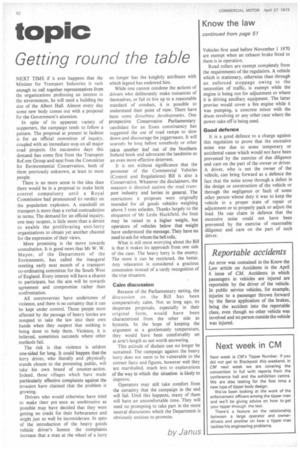topic
Page 54

If you've noticed an error in this article please click here to report it so we can fix it.
Getting round the table
NEXT TIME if it ever happens that the Minister for Transport Industries is rash enough to call together representatives from the organizations professing an interest in the environment, he will need a building the size of the Albert Hall. Almost every day some new body comes out with a proposal for the Government's attention.
In spite of its apparent variety of supporters. the campaign tends to follow a pattern. The proposal at present in fashion is for an official committee of inquiry, coupled with an immediate stop on all major road projects. On successive days this demand has come first from the Transport Refirm Group and next from the Committee for Environmental Conservation, both of them previously unknown, at least to most people.
There is no more sense in the idea than there would be in a proposal to make birth control compulsory until a Royal Commission had pronounced its verdict on the population explosion. A standstill on transport is more than a verbal contradiction in terms. The demand for an official inquiry, one may suspect, is little more than a device to enable the proliferating anti-lorry organizations to obtain yet another channel for the expression of their views.
More promising is the move towards consultation. It is good news that Mr W. W. Mayor, of the Department of the Environment, has called the inaugural meeting early next month of a transport co-ordinating committee for the South West of England. Every interest will have a chance to participate, but the aim will be towards agreement and compromise rather than confrontation.
All controversies have undertones of violence, and there is no certainty that it can be kept under control. Those people most affected by the passage of heavy lorries are tempted to take the law into their own hands when they suspect that nothing is being done to help them. Violence, it is believed, sometimes succeeds where other methods fail.
The risk is that violence is seldom one-sided for long. It could happen that the lorry driver, who literally and physically stands closest to the protesting public, will take his own brand of counter-action. Indeed, those villages which have made particularly effective complaints against the invasion have claimed that the problem is growing.
Drivers who would otherwise have tried to make their pre ence as unobtrusive as possible may have decided that they were getting no credit for their forbearance and might just as well be inconsiderate. In spite of the introduction of the heavy goods vehicle driver's licence the complaints increase that a man at the wheel of a lorry no longer has the knightly attributes with which legend has endowed him.
While one cannot condone the actions of drivers who deliberately make nuisances of themselves, or fail to live up to a reasonable standard of conduct, it is possible to understand their point of view. There have been some disturbing developments. One prospective Conservative Parliamentary candidate for an Essex constituency has suggested the use of road ramps to slow down and discourage the juggernauts. It will scarcely be long before somebody or other takes another leaf out of the Northern Ireland book and advocates the landmine as an even more effective deterrent.
It is not without significance that the promoter of the Commercial Vehicles (Control and Regulations) Bill is also a Conservative. Whatever the disclaimers, the measure is directed against the road transport industry and lorries in general. The restrictions it proposes were originally intended for all goods vehicles weighing above 3 tons unladen. Thanks largely to the eloquence of Mr Leslie Huckfield. the limit may be raised to a higher weight, but operators of vehicles below that weight have understood the message. They have no need to ask for whom the bell tolls.
What is still most worrying about the Bill is that it makes its approach from one side of the case. The heavy lorry is the enemy. The more it can be restricted, the better. Any relaxation is considered a gracious concession instead of a tardy recognition of the true situation.
Calm discussion
Because of the Parliamentary setting, the discussion on the Bill has been comparatively calm. Not so long ago, its desperate proposals, especially in their original form, would have been characterized from the other side as hysteria. In the hope of keeping the argument at a gentlemanly temperature, they would have been comfortably set at arm's length as not worth answering.
This attitude of disdain can no longer be sustained. The campaign against the heavy lorry does not seem to be vulnerable to the correct facts and figures, however well they are marshalled, much less to explanations of the way in which the situation is likely to improve.
Operators may still take comfort from the certainty that the campaign in the end will fail. Until this happens, many of them will have an uncomfortable time. They will need no prompting to take part in the more neutral discussions which the Department is obviously anxious to promote.












































































































